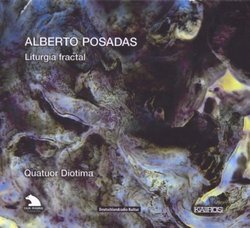| All Artists: Alberto Posadas, Quatuor Diotima Title: Liturgia Fractal Members Wishing: 0 Total Copies: 0 Label: Kairos Original Release Date: 1/1/2009 Re-Release Date: 7/14/2009 Genre: Classical Styles: Chamber Music, Historical Periods, Classical (c.1770-1830) Number of Discs: 1 SwapaCD Credits: 1 UPC: 9120010281501 |
Search - Alberto Posadas, Quatuor Diotima :: Liturgia Fractal
 | Alberto Posadas, Quatuor Diotima Liturgia Fractal Genre: Classical
Liturgia fractal is a cycle of five string quartets in which each quartet is based on a different fractal model. Working with a fractal model, as something of an allegory of the way waves move, is based on the concept of a... more » |
Larger Image |
CD DetailsSynopsis
Album Description Liturgia fractal is a cycle of five string quartets in which each quartet is based on a different fractal model. Working with a fractal model, as something of an allegory of the way waves move, is based on the concept of a cycle as a "natural entity." The cycle consists of five quartets, but it is also possible to perform two or three in various combinations without losing the balance achieved within the overall collection. Similar CDs
|
CD Reviews"Fractal Liturgy," a string quartet "liturgy of nature" R. Hutchinson | a world ruled by fossil fuels and fossil minds | 01/01/2010 (5 out of 5 stars) "This new work by Spanish composer Alberto Posadas, composed from 2003 to 2007, is not a collection of string quartets, but rather a cycle of five quartets, meant to be performed as a whole with only brief pauses punctuating the parts, 52 minutes in all. It is performed here with energy and precision by the Quatuor Diotima, and recorded in January 2009 for Kairos.
According to Posadas, "...[e]ach quartet is based on a different fractal model. Working with a fractal model, as something of an allegory of the way waves move, is based on the concept of a cycle as a 'natural entity'. The combination of the idea of self-similarity (fractal) with that of spreading-out (wave) reflects the search for a sound which develops organically, as if it were just another part of nature." Hence, Posadas considers this to be a "liturgy of nature," based on idea that "models from nature can be applied to artistic creativity." The use of mathematics, algorithms, in composition always frightens and repels some people, which has always struck me as odd given the careful mathematical symmetry utilized by universally revered composers such as Bach and Mozart. To my ears, this is powerful and compelling music. My first reaction was that these could be the string quartets Xenakis never wrote. I consider Iannis Xenakis to be one of the three best composers of the late 20th century, along with Elliott Carter and Gyorgy Ligeti, but I find his music for string quartet disappointing. Apparently the form never inspired him the way large orchestral music and electronics did. Posadas uses a similar approach with stunning results. Posadas, born in 1967, actually studied with Francisco Guerrero, sometimes called "the Spanish Xenakis," and learned from him the use of mathematical combinatorics and fractals. Here is a summary of "Liturgia fractal" from Pierre Morlet, cellist for the Quatuor Diotima: "The first piece, "Ondulado tiempo sonoro..." (2003) is a sort of introduction in which one can find nearly all the cycle's thematic and expressive elements. The second, "Modulaciones" (2006), is the longest and probably also the trickiest, with lots of overtones and double stops, as well as very precise dynamic indications. "Orbitas" (2007) has a very deep-running and powerful density thanks to its isorythmic chords. "Arborescencias" (2007), the fourth piece, is a sort of cadenza for the first violin, and its tension and balance are distinct from those of the other movements. Although this means that its language is perhaps not as dense, it is that much more virtuosic -- particularly for the first violin. And finally there's "Bifurcaciones" (2007), which does actually sound like a concluding movement and, though it isn't a simple piece of music, it does contain an additional burst of energy at the end." If you like the complex string quartets of Babbitt, Carter, Ferneyhough, or Ligeti, or you are looking for a jolt of vision and energy to counteract the prevailing prettiness and lack of substance of much contemporary music, then by all means check out this new string quartet cycle by Alberto Posadas! " |

 Track Listings (5) - Disc #1
Track Listings (5) - Disc #1


